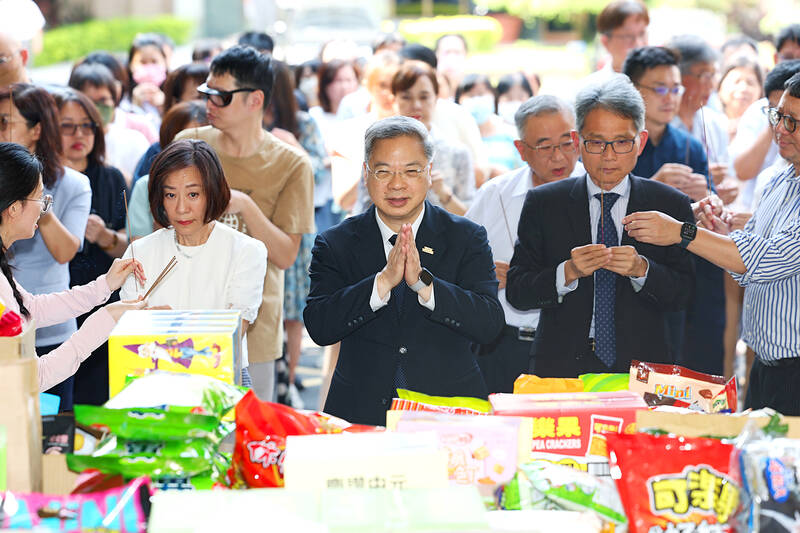The government is to set up a professional team to help the Taiwan Electrical and Electronic Manufacturers’ Association (TEEMA) and other industry associations establish high-tech parks overseas, Minister of Economic Affairs Kung Ming-hsin (龔明鑫) said yesterday.
The ministry has learned from industry groups, such as TEEMA, that their member companies intend to expand globally, and the government would fully support them by creating a cross-ministerial professional team, Kung said.
Kung on Monday met with leaders from major industry associations, including TEEMA chairman Young Liu (劉揚偉).

Photo: CNA
Liu, chairman of Hon Hai Precision Industry Co (鴻海精密), said at the time that TEEMA would cooperate with the government and help establish technology parks in the US, Mexico, Poland or India to help Taiwanese firms bypass US tariffs.
As such work involves park development, operational management, tenant support and supply chain assistance, as well as communication with local authorities on infrastructure issues, such as water, electricity and roads, it would be better for the government to handle negotiations, Kung said yesterday.
With a US federal appeals court ruling last week that many of US President Donald Trump’s tariffs were illegal, Kung said Taiwanese industries might face fewer challenges if the US Supreme Court upholds the lower court’s ruling, prompting the US government to change its tariff policy.
Still, the ministry would continue to provide financial support, promote structural transformation and help companies expand into other markets, with most policies expected to remain on schedule, he said, adding that he learned during recent visits about the difficulties machine tool makers and other companies in traditional industries face.
Aside from tariffs, traditional industries face a host of other challenges, he said, adding that the ministry would do its best to assist heavily affected industries.
Kung reiterated that the ministry would provide key data on large-scale layoffs and difficulties confronting traditional industries, and small and medium-sized enterprises, when government-backed minimum wage and electricity rate committees meet in the coming weeks.
The ministry would also discuss potential measures with the Ministry of Labor to help industries facing greater challenges, Kung added.

NEW IDENTITY: Known for its software, India has expanded into hardware, with its semiconductor industry growing from US$38bn in 2023 to US$45bn to US$50bn India on Saturday inaugurated its first semiconductor assembly and test facility, a milestone in the government’s push to reduce dependence on foreign chipmakers and stake a claim in a sector dominated by China. Indian Prime Minister Narendra Modi opened US firm Micron Technology Inc’s semiconductor assembly, test and packaging unit in his home state of Gujarat, hailing the “dawn of a new era” for India’s technology ambitions. “When young Indians look back in the future, they will see this decade as the turning point in our tech future,” Modi told the event, which was broadcast on his YouTube channel. The plant would convert

‘SEISMIC SHIFT’: The researcher forecast there would be about 1.1 billion mobile shipments this year, down from 1.26 billion the prior year and erasing years of gains The global smartphone market is expected to contract 12.9 percent this year due to the unprecedented memorychip shortage, marking “a crisis like no other,” researcher International Data Corp (IDC) said. The new forecast, a dramatic revision down from earlier estimates, gives the latest accounting of the ongoing memory crunch that is affecting every corner of the electronics industry. The demand for advanced memory to power artificial intelligence (AI) tasks has drained global supply until well into next year and jeopardizes the business model of many smartphone makers. IDC forecast about 1.1 billion mobile shipments this year, down from 1.26 billion the prior

People stand in a Pokemon store in Tokyo on Thursday. One of the world highest-grossing franchises is celebrated its 30th anniversary yesterday.

Zimbabwe’s ban on raw lithium exports is forcing Chinese miners to rethink their strategy, speeding up plans to process the metal locally instead of shipping it to China’s vast rechargeable battery industry. The country is Africa’s largest lithium producer and has one of the world’s largest reserves, according to the US Geological Survey (USGS). Zimbabwe already banned the export of lithium ore in 2022 and last year announced it would halt exports of lithium concentrates from January next year. However, on Wednesday it imposed the ban with immediate effect, leaving unclear what the lithium mining sector would do in the